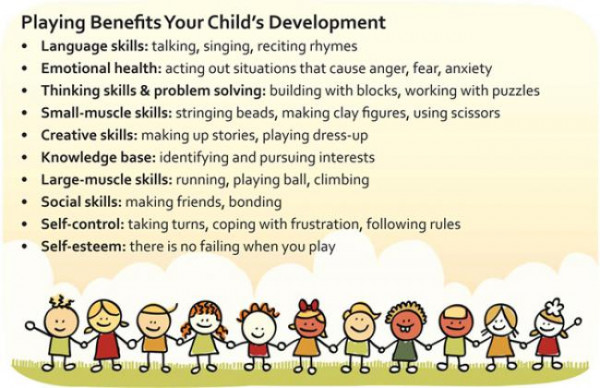We Never Outgrow our Need to Play
 Although playing may look like fun with no purpose, it actually prepares children for a complex social world. Active, creative play benefits just about every aspect of child development. Evidence suggests that play can help children boost brain function, improve fitness and coordination, refine social skills, master emotions and learn to make decisions
Although playing may look like fun with no purpose, it actually prepares children for a complex social world. Active, creative play benefits just about every aspect of child development. Evidence suggests that play can help children boost brain function, improve fitness and coordination, refine social skills, master emotions and learn to make decisions
Unstructured, creative, physical play lets children burn calories and develops all kinds of strengths. In free play, children choose the games, make the rules, learn to negotiate and release stress. Free play often involves fantasy. If children want to learn about being a fireman, they can imagine and act out what a fireman does. And if something scary happens, free play can help defuse emotions by working them out. Without the opportunity to imagine and experience interactions through play, a child may find it difficult to inhibit impulses, switch tasks easily and play independently.
 Kids don’t need expensive toys to get a lot out of playtime. Simple play with building blocks can help build children’s spatial skills, giving them an early start toward the later study of science, technology, engineering or math. In a way, the child becomes a young scientist, checking out how the world works.
Kids don’t need expensive toys to get a lot out of playtime. Simple play with building blocks can help build children’s spatial skills, giving them an early start toward the later study of science, technology, engineering or math. In a way, the child becomes a young scientist, checking out how the world works.
It’s important to engage in a variety of activities, including physical play, social play and solitary play. Although team sports help develop important skills, they are no substitute for free play, where the child is making the decisions. Children can’t learn to make decisions if they're always told what to do.

Free play is becoming endangered. As media screens draw kids indoors, hours of sitting raise the risk for obesity and related diseases. When it comes to video games and other media, parents should monitor content, especially violent content, and limit the amount of time children sit. There’s also been a national trend toward eliminating school recess, which has important consequences for young children who concentrate better when they come inside after a break from the schoolwork.

Children feel loved when they have fun with their parents. There is no better way to bond with, and learn about, your child than through play.
The data also shows that human beings never outgrow their need to play. Older children, including teens, also need to play and daydream, which helps with problem-solving and creative imagination. Adults need their breaks, physical activity and social interaction. The value of play is so widely acknowledged that recreation therapy has become an essential part of many patients’ recovery from critical injury or illness. Without play and recreation, people can become isolated and depressed. When we are physically and socially active, it gives life meaning.
Source: NIH NEWS in Health, Department of Health and Human Services
